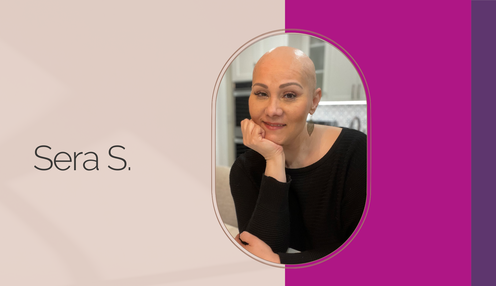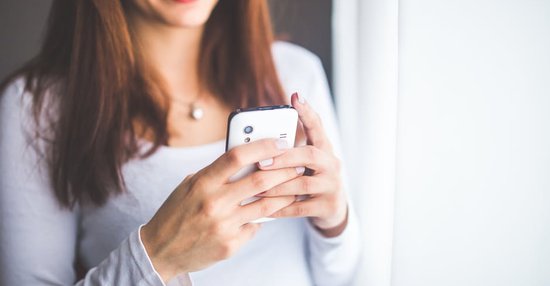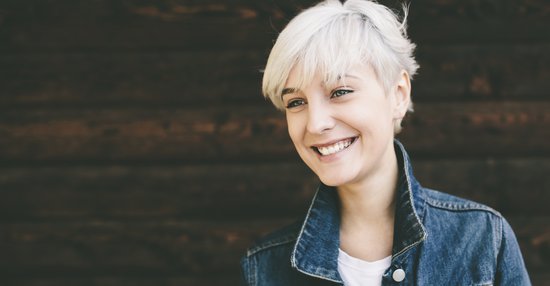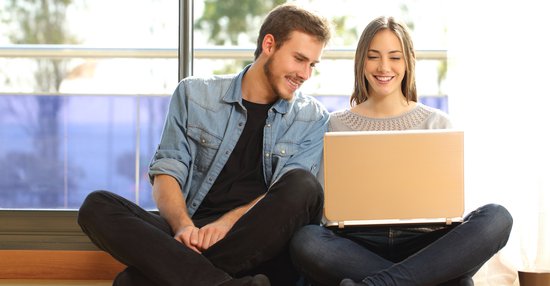Sera: When we feel unwell mentally, it can have a dramatic impact on our healing process physically. For me, looking good has long been paramount in feeling better. Before I was diagnosed with cancer, I suffered from an autoimmune disease, chronic fatigue, and fibromyalgia – so not feeling top-notch has kind of been my thing for about 15 years. And even if I feel like crap, I always want to look good on the outside because that makes me feel better. It’s part of my rehabilitation.
I’m in the midst of chemotherapy treatment now, and I will not allow cancer and my treatment to dictate how I look. Yeah, okay, I’m bald, and my skin is blotchy and hyper-pigmented and dry, but whatever. I’m going to try to be as attractive as possible by wearing my head scarf in the most fashionable way or my wig as best I can, and by taking care of my skin. I always have a face full of makeup when I go out, even if it’s to the hospital for chemo. I wear my little heeled booties, too – not a leisure suit or whatever. Whether it’s vanity or not, I don’t care – it makes me feel better. And looking good is a big part of my healing process. It makes me feel more like my regular self and gives me a sense of control.
With cancer, we feel out of control a lot. My journey started during the pandemic. I’d had a persistent cough for many weeks after having had COVID, and I was having trouble breathing. I ended up in the ER, where I got a chest X-ray. The doctor noticed some striations and sent me to a respirologist, who ordered a CT scan. They found some nodules in my lungs and something in my left breast. It was a serendipitous find, thankfully. I was sent for a mammogram and an ultrasound, and then a biopsy, and then the results came in: stage 1 ductal carcinoma.
Frank: It hit us like a ton of bricks when they first told us. Everything started to spin and we had a hard time grasping the situation we were in.
Sera: Getting the diagnosis definitely sucked. There’s a strong history of cancer in my family – my mom had breast cancer, as did all of her sisters – so I wasn’t shocked when I got the news, but I was upset. I know it sounds ridiculous and cliché, but the timing was just so bad. I had just gotten a new promotion at work that I was really excited about, Frank and I were enjoying spending time together and travelling, we were relishing time spent with our two adult children, and Frank, who’s an entrepreneur, was busy building his business. I felt ripped off and had a “why me, why now” feeling.
But there was nothing to do except to keep moving forward. And after my diagnosis, things moved quickly. I had a partial mastectomy within a week, and the resulting pathology showed that the cancer was aggressive, with likely recurrence. I was given my treatment plan: chemotherapy, radiation, and five years of hormone therapy. So much has changed in such a short period of time, from a simple cough. It has been quite the whirlwind for us, but we gotta do what we gotta do.
During my first chemo treatment, less than two weeks in, I lost my hair. That was hard. I had long, thick, curly hair, and it was something I was known for. Losing it was a big deal and something to get used to. I don’t think that makes me – or any woman who says the same thing – vain.
During this same first session, my oncology nurse gave me a lot of resources. One of the things she highly recommended was the Look Good Feel Better (LGFB) program. When I looked it up and saw that it was all about skincare and makeup and wigs and head accessories, I immediately signed up. And the sessions were great – highly interactive and full of insights. I already knew how to put on makeup, but a lot of what they taught was new to me – like about not using makeup wands when you have cancer but using Q-tips and cotton balls instead, for example. I learned a lot from the head accessories and wigs workshop, too. I’ve mastered the art of head scarves now. And it was comforting to see all the other people on the call, from all different parts of Canada, who were going through the same thing.
Frank: Losing one’s hair, the skin changes – these are things that the average person has never had to deal with. Hair is part of the female identity, and to go from having crazy long curly beautiful hair to nothing has gotta be a huge shock to the system. How does one deal with that? Having resources that someone can turn to is worth its weight in gold.
Sera: When the kit was delivered to me – holy cow! I was so surprised. I knew it was coming in the mail, but seeing the size and fullness of it, how every little detail was covered – from the toner to the concealer – and how this was available for people who had no clue how to deal with skincare and makeup – it made me cry. LGFB had everything covered. And I knew that there were people out there who would be using the products and that this would put a smile on their faces and help them to feel better about themselves. It’s exactly in the name of the organization – look good, feel better.
Frank: I think what LGFB is doing is fantastic. Luckily, we’re in a position where we don’t go without, but I know that not everyone is like that. I sat there with Sera when that kit came, and we spent about an hour going through each item. I’ll be honest – I don’t understand anything about the different products. But seeing Sera’s reaction was incredible. Anything that can help someone who’s going through something like cancer is something that’s worth supporting.
And the workshops allow people who are in the same situation to get together, even if it’s just for moral support. Seeing Sera participate in the workshop, I don’t think I’ve ever seen her do something like that before – she was really excited and gunning to go. Fifteen minutes before the workshop started, she was ready to go, with all the stuff set out around her that she needed.
Little things like that make a big difference. People going through any form of cancer treatment can feel helpless. It’s out of their control. People don’t get cancer, especially the type Sera has, because of anything they did – it’s just bad luck. For someone who likes to fix things, a “fixer” like Sera, this can cause a real internal struggle. And so to see something that can bring some brightness or happiness to someone going through that type of situation, and that can restore a bit of that feeling of personal control, is just incredible.
Sera: We’re both so thankful for everything that LGFB is doing. I downloaded their recent magazine, and I’ve read every page of that magazine and watched all the embedded videos. All the tips and tricks, and hearing people’s stories, is amazing.
Frank: It’s empowering.
Sera: Exactly, it’s empowering. It makes me feel better and shows me that I’m going to get through this. On days that I’m feeling down or sorry for myself, I look through my bookmarked magazine and say to myself, “Okay, you got this girl!”
Frank: That’s exactly why I was compelled to donate to LGFB. This organization makes people feel better, and that’s powerful. People don’t know about LGFB until they need it. But I’m so grateful that it exists.



